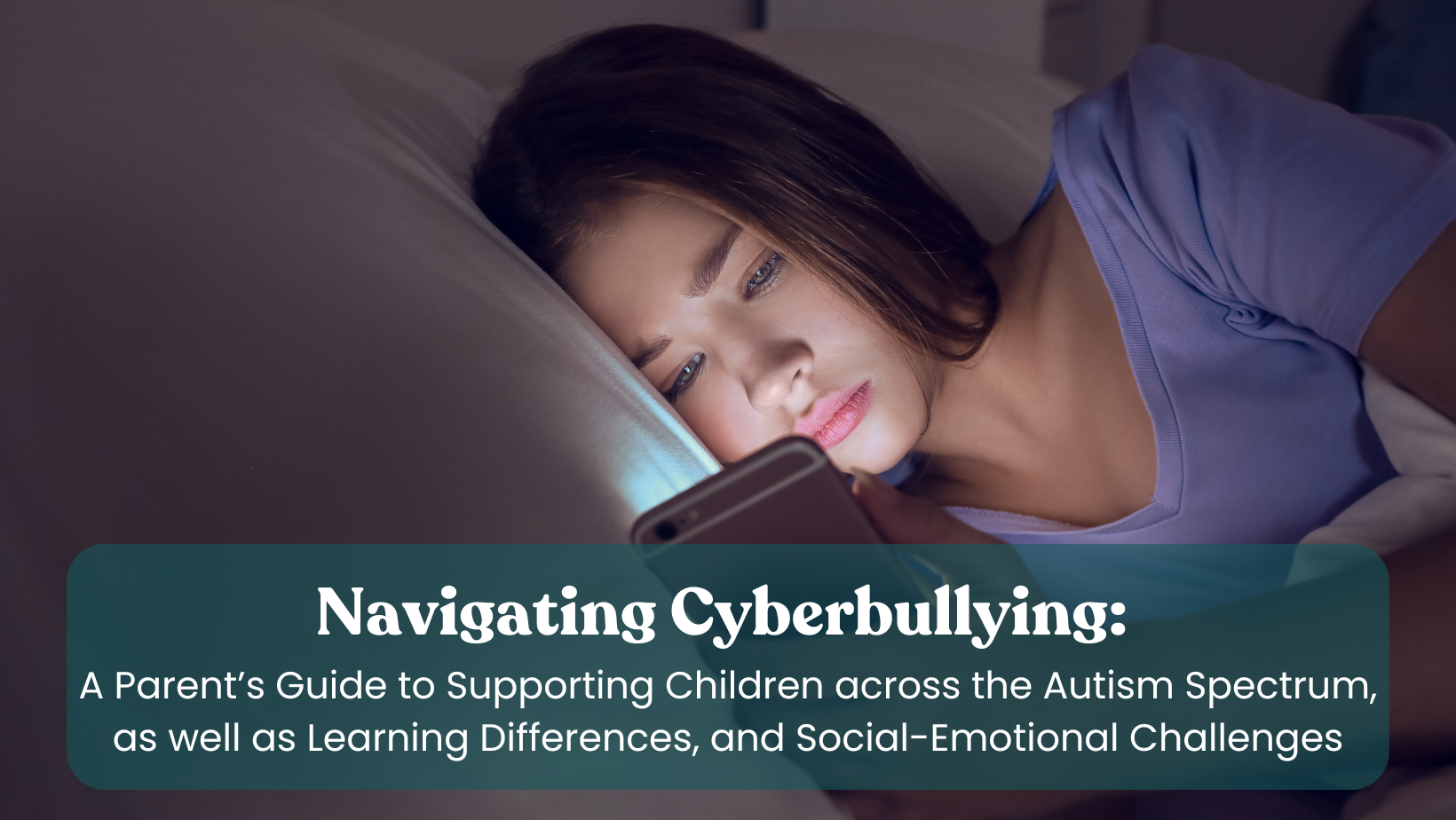
Navigating Cyberbullying: A Parent’s Guide to Supporting Children across the Autism Spectrum, as well as Learning Differences, and Social-Emotional Challenges
In today’s digital age, cyberbullying has become a pressing concern for many families. For children across the autism spectrum, or those with learning differences and social-emotional challenges, navigating online interactions can be particularly complex and distressing. It’s crucial for parents to address this issue with sensitivity, understanding, and in age-appropriate terms. Here’s how you can talk to your kids about cyberbullying to help them feel supported and empowered.
Understanding the Unique Challenges
Children across the autism spectrum, or with learning differences, as well as social-emotional challenges often face heightened vulnerabilities in the online world. They may struggle with interpreting social cues, managing emotional responses, or handling conflicts. These difficulties can make them more susceptible to cyberbullying and less confident in addressing it.
Start the Conversation Early
Begin by introducing the topic of cyberbullying in a way that is age-appropriate and relatable. Use clear and simple language to explain what cyberbullying is and why it’s harmful. For autistic children or those with learning differences, visual aids or social stories can be very effective. You might say, “Cyberbullying happens when someone uses the internet or text messages to hurt others. It’s important to know that no one deserves to be treated badly.”
Use Real-Life Examples
One recent example that underscores the seriousness of cyberbullying is Gus Walz’s story, the son of Democratic VP Candidate Tim Walz. Gus, a teenager with autism, faced relentless online harassment that impacted his well-being and self-esteem. His experience highlights how cyberbullying can affect children deeply and serves as a powerful reminder of the need for vigilance and support.
You can use Gus’s story as a conversation starter, explaining how even though Gus’s situation was very tough, he had people who helped him. Share with your child that they don’t have to face such challenges alone and that there are steps they can take to protect themselves and seek support.
Encourage Open Communication
Create a safe space where your child feels comfortable sharing their online experiences. Let them know that they can come to you with any concerns without fear of judgment or reprimand. Ask open-ended questions like, “Have you ever had any problems with friends online?” or “How do you feel about the way people talk to you or about you on the internet?”
Teach Online Safety and Resilience
Equip your child with strategies to handle cyberbullying. Discuss how to block or report abusive messages and how to keep their online interactions positive. Role-play different scenarios so they feel more confident in managing potential conflicts. Emphasize the importance of not responding to negative messages and keeping personal information private.
Reinforce Self-Esteem and Empowerment
Children who experience cyberbullying may struggle with their self-esteem. Reinforce their self-worth by celebrating their strengths and achievements. Encourage them to engage in activities they enjoy and excel in, which can help build their confidence and resilience. Outdoor activities, recreational activities, and spending quality time with family can also be a great way to foster support, resilience and confidence in children.
Collaborate with Educators and Support Professionals
Coordinate with your child’s school or support team to ensure they have additional resources and understanding. Schools often have policies and programs in place to address cyberbullying, and working together can provide a more comprehensive support system for your child.
Talking to your child about cyberbullying is an ongoing process that requires patience and empathy. By addressing their concerns with understanding and providing them with the tools to handle online challenges, you can help them feel more secure and supported. Remember, your involvement and guidance play a crucial role in helping them navigate the digital world with confidence.
If you’re facing challenges in discussing cyberbullying or need additional support, please contact us at Lumina Counseling – Life Illuminated (luminacounselingla.com) for resources and guidance. Together, we can work towards creating a safer, more inclusive online environment for all children.
For more information about how to prevent and speak to your children about cyberbullying, please contact Lumina Counseling Therapist Tasia Kristich, AMFT at tkristich@thehelpgroup.org

Tasia Kristich, AMFT
I began my studies at the University of South Carolina in 2015 majoring in experimental psychology and biology and went on to obtain my master’s degree from Pepperdine University in Clinical Psychology with a Marriage and Family Therapy emphasis in June of 2023. Additionally, I have a Psychological First Aid (PFA) Certificate and will be completing EMDR training by November 2024.
Since there is no one-size-fits all approach to therapy; our work together will be uniquely tailored to your goals and experiences. As a trauma informed therapist, I take a broad and integrative approach incorporating traditional psychotherapeutic modalities along with mindfulness-based practices, and somatic body-based work. It is my priority and privilege to ensure a protected environment where true, authentic work can be done with a peace of mind and abundance of support.
